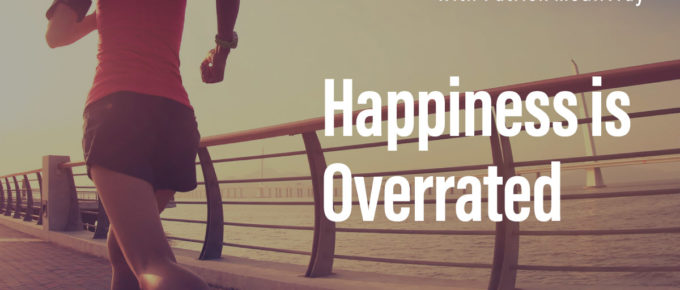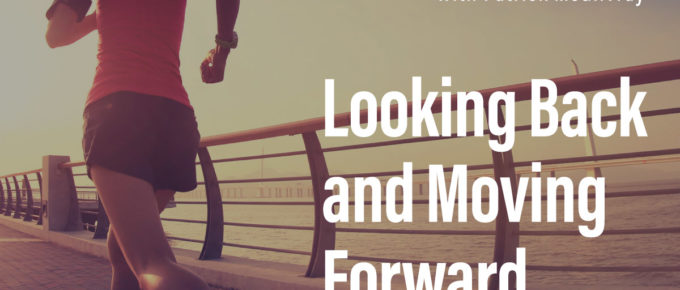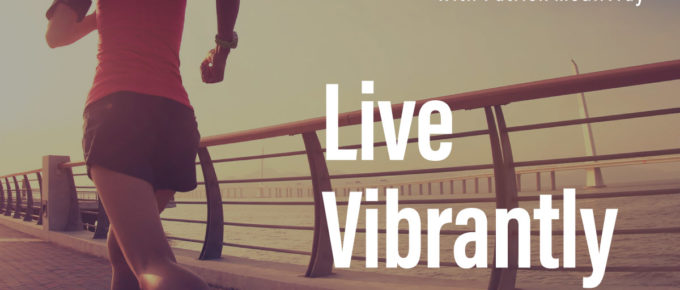There’s a lot of talk out there in the personal development world about happiness. There are so many books on how to be happy all the time and how to be happy about everything, and honestly, I see …
77. Happiness is Overrated
Podcast Transcript
My name is Patrick McGilvray, and I’m an experienced marathoner, ultra runner, Sports Nutritionist, Master Life Coach, and weight loss coach for runners. I’ve dedicated my life to helping runners just like you properly fuel your body and your mind. So you can get leaner, get stronger, run faster, and run longer than you ever thought possible. This is Running Lean.
Hey there, and welcome to Episode 77, of Running Lean. My name is Patrick McGilvray. And I am so happy to be here talking about happiness today. And my take on happiness, which might be a little different from what most people say about happiness. I have this idea that happiness might be a little overrated. So I’m going to talk about that today.
Listen, there’s a lot of talk in the personal development space, about happiness about how to become happy all the time, and how the goal is to just like, we need to be happy all the time. There are books on this, there are podcasts on this, there are all kinds of teachings out there about how to be happy all the time. And honestly, I think this is kind of a problem because my take on happiness is a little bit different.
I think happiness is not the goal, I don’t think our goal or our purpose in life is to be happy all the time. So I believe we are put here on this earth for something bigger, and much more powerful than just like being happy.
Okay, so in this episode of the podcast, I’m going to explain all of that, I’ll break it down. I’ll explain what I mean when I say that happiness is overrated, and I’ll offer my take on what I believe my life’s purpose and your life’s purpose really is.
And then as a little extra something, be sure to listen to the end of this episode because I’m going to walk you through a very powerful happiness, exercise. Okay, so be sure to listen to the end of this one, because it’ll be kind of fun, fun thing for you at the end here.
But first, if you haven’t already joined us on Facebook, come check us out the Running Lean podcast community, I created this group as an extension of this podcast so that we could have more of a two-way conversation because it’s just me here talking into this microphone. I know you’re listening on the other end there. But I like to have that interaction.
And so in the Facebook group, you can ask questions, I can chime in and help answer those questions. And then each week, I do a little coaching a little teaching in the group. And I love doing that. It’s super fun to connect with you guys. live and in person, so to speak, right virtually, virtually live and in person. So come and check us out on Facebook, just go to Facebook and search for Running Lean community and you’ll find us we have fun, we have a lot of fun.
Here’s another five-star review of the Running Lean podcast. This one’s from Maddie. And she says “Five-star plus, I’ve only been listening a few weeks and listened to most podcasts more than once very informative, very encouraging. I’m also a member of the Facebook group, everyone is there to support, encourage and help each other.”
Thank you, Maddie, for that awesome review. And yes, the Facebook group is amazing. And if you feel the urge to drop a review of the podcast, I would really appreciate it. You can just go to Apple podcasts or Spotify or audible wherever you listen to your podcasts and tap the stars. Leave a few words and you’re good to go. I’d really appreciate that. Thank you so much.
And then listen, if you’re ever looking for a little bit of help with all this stuff, losing weight, becoming a fat-adapted runner, changing your mindset, you know, working through all the issues we have around sticking to our plan. This is what I do as a one-on-one coach, this is the kind of work we do together. Listen, everybody I work with experiences some sort of a transformation.
Sometimes it’s the transformation of the mind. Sometimes it’s the transformation of the body sometimes it’s both. But I promise you that working one on one with a coach for a period of time can be very transformative. And just imagine what you can accomplish in like three months working one on one with a coach. It’s It’s amazing. Right?
So a coach just doesn’t you know, tell you what to do. A coach is there to support you. guide you offer you encouragement, support, knowledge experience, but also a coach there to help you do the things that you know you should do that you don’t want to do. There might be a little bit of tough love involved with coaching as well. That’s all part of it.
But the goal of coaching is not to just teach you a bunch of stuff, but to help you become the person that you ultimately want to become. So if you’re ever interested, you can just go to runningleanpodcast.com/apply and apply for coaching, we’ll get on a Zoom call, we’ll have a conversation about and see if it’s a good fit for you.
No obligations, it doesn’t cost anything to jump on this call with me. It’s just me and you, having a little chat about your goals and seeing if coaching is something you’re interested in. And if you’re a good fit, cool, awesome.
Okay, let’s get into this topic because I’ve been thinking about this for a while now. And I’m finally like, okay, I’m ready to have this conversation with you guys. This is one of those maybe a little bit of tough love conversations. And I just want to start out by saying, like, happiness is not the goal, happiness is not the end result that we’re looking for. At least it shouldn’t be, okay?
But a lot of times I talk to people, and I’ll say like, tell me about your goals, what do you want for yourself? And inevitably, something will come up, like, oh, I just want to be happy. You know, I know that if I just lose weight, then I’ll be happy. Or if I can just run a faster marathon, then I’m going to be happy.
And I want to caution you guys against this. Because if you’re looking at happiness, as the end result of, of what you really want for yourself is like, that’s the goal I’m trying to reach, I’m trying to get to this place where I can just be happy all the time, you are going to be disappointed. It is almost impossible for you to be happy all the time. And I’ll talk about this more, I’ll break this down for you here.
But I just want you to know that happiness is one of those emotions that we want. And we desire. It’s one of our positive emotions, right, it’s a wanted emotion, it’s something we want more of in our life. And we can absolutely have more happiness in our life. But to think that, like, we’re going to be happy all the time.
And I think this is the mental image we project and this is the idea we get in our heads about, you know, if I could just lose this weight, if I could just lose the 30 pounds, get back to this weight I was when I first got married or when I was, you know, at my peak, then then I’ll be happy.
You know, and we do this in other areas of our lives, too. Like, oh, if I just had a better job, I’d be happy. Or if maybe I had a better relationship, you know, I’d be happy. And I want to caution you against thinking this way. Because accomplishing some big goal in your life or, you know, changing, you know, moving or changing a job or changing a relationship. Those things are all great. And you should always be wanting to accomplish things in your life.
But if the end goal is to be happy, you’re going to be disappointed. Happiness should not be the end goal, okay? Because happiness is just an emotion and emotions we can experience they come and they go, you know, you feel happiness, you feel joy, you feel sadness, you feel sorrow, you feel shame, or guilt, or stress or boredom. These are all emotions that we experience at different times in our lives, different times in our day, you can go through a whole day where you’re feeling a whole breadth of emotions, right?
Which I think is super cool, because as human beings, we get to experience all of these cool emotions. And as far as we know, we’re the only creatures in the universe that experience emotion in this way, especially this wide breadth of emotions.
I think somebody told me once they’re like dogs, dogs feel emotions, too. And I’m like, Yeah, probably. Cats, not so much. Dogs. Yes. But we get to experience all these different emotions, okay? And if we’re just, you know, set on, like, I just want this one emotion to be around forever. And that’s it. Like, I think this is, this is dumb to think this way, honestly. Okay.
So I don’t want you to be in this place of like, chasing happiness and making happiness the goal. Okay. Happiness is not a permanent state of being, it’s not something that you can just experience all the time. And if you see people that are like, Oh, that person is just happy all the time. I promise you they are not.
And they why would you want to be? Why would you want to be happy all the time? The purpose of your life is not to be happy all the time. Because when you’re happy. Where are you like everything is great, right? You’re comfortable. Everything is going perfectly well right? and you’re, you get to this place of contentment. Right?
And that’s okay to feel contentment, that’s okay to feel comfortable. But I think we get into this place of, oh, I just want to be happy. And then you want to be content and you get comfortable and just feel sort of, you know, like your life is sort of soft, soft and happy and comfortable all the time. Is that really what you want for yourself?
So you no longer need to work to improve yourself, you no longer need to push yourself, you no longer need to change anything in your life, because you’re just happy. I think this is the problem, right? I have this vision of being happy all the time, like this, if you guys saw the movie, Wally, the cruise ship in space, you know, with all the fat happy people, like everybody’s become so happy. And they don’t have to do anything. And they’re so comfortable that they’re so fat, they can’t even walk anymore.
So they get carted around in these little hover chairs. And there are all these robots that do everything for them. And all they do is like sit around and eat and drink all day, and they’re just fat slobs, right? It’s just like, so hilarious.
But it’s not unlike this vision of like, Oh, I just want to be happy all the time. You know, and just happy, soft, comfortable, you know, and content. And I don’t think this is what we want for ourselves. So this is kind of what I mean when I say happiness is overrated. I think if you want to evolve and you want to grow and you want to become something more than what you are right now, that there is a level of unhappiness required that there is some discontentment that is required if you want to become more.
And this takes me to what I believe the purpose of life really is for us, the purpose of your life is not to be happy all the time, the purpose of your life is to become more. Becoming more requires you to be somewhat unhappy and somewhat discontented with how things are and somewhat uncomfortable, right?
For yourself or others for your community for the world. Like there needs to be some level of discontentment with the way things are, in order for you to want to grow and become more to change to evolve. Becoming more means experiencing some amount of discomfort, some amount of pain or hardness or suffering.
We don’t grow and evolve by sitting around on our butts in our comfort zone all the time. If I could grow and become more by just sitting on the couch watching Netflix all day long, I would absolutely do that. But it doesn’t work that way. It does not work that way.
Becoming more means and I want to break this down for you. Because I talk about this idea of becoming more what does that mean? Becoming more means becoming more of who you are not becoming someone else. But just becoming more of you. More of who you want to be.
There’s this version of you that’s inside you that’s lurking inside you that maybe you’ve always been afraid to, to let her out. That’s what I’m talking about. I want that for you. I want you to be more authentically you. And I don’t know if I’ve shared this with you guys before this quote from Dr. Seuss. And it’s from one of the Dr. Seuss books. I can’t remember which book it’s from. But the quote is this: “Today you are you that is truer than true. There is no one alive who is youer than you.”
Anytime I talk about like becoming more you I always this quote always comes to mind like there’s no one alive who’s youer than you. Becoming more means living up to your true potential becoming the best you can be right? Most of us are living up to about 40% of our potential. This is below average, I want more for myself, I want to become more.
I want more than that for myself. I want you to want more than that for yourself. I don’t want to be below average. I want to be well above average 40% is not cool with me. Shouldn’t be cool with you either. We need to tap into more of who we are more of what we are capable of.
So to become more though it means you have to experience some level of discontentment or discomfort with where you are right now. And that’s okay. It’s not a bad thing. Like to not be happy where you are right now this is okay. That just means you want more for yourself. It’s amazing actually, right, if there’s you know, discontentment a little unhappiness that will actually serve you and actually help to drive you forward.
And being unhappy sometimes or being discontented sometimes. Don’t look at this as a negative thing. We think of this as being negative, I’m discontented, oh, I’m unhappy. It’s okay. You know, Life is 50/50. You know, we experience 50% of the time, roughly, we have positive emotions, and 50% of the time, you know, we experience quote, unquote, like negative emotions, right?
And it’s meant to be that way, life is supposed to be about half and half. Because as humans, we get to experience all the emotions, this wide breadth of emotions, the good and the bad, we need the contrast. Because without sadness, we wouldn’t have happiness. without sorrow, you wouldn’t know what joy feels like without conflict, you wouldn’t feel peaceful.
Without some sort of discontentment, you wouldn’t have any reason to grow. And to become more. We need the contrast. The contrast provides clarity for us. Otherwise, all these emotions would all just like, blend together, and just be like, blah, right?
So we have, you know, emotions that feel good and positive, and there are emotions that we feel that we experience and we feel maybe not so good. And then we might label these as negative, okay.
And listen, negative emotions are not to be avoided or pushed away or numbed out, we do this all the time, we experienced some sort of negative emotion, and we want to just push away wanting to go with his fastball, get back to being happy, I don’t want to feel this way.
Do not make the mistake of pushing these emotions away, do not make the mistake of trying to just feel happy all the time. Because when you do this, you get caught in this practice of running away from half of the emotions you’re trying to that you want to feel, you know, end up, pushing away, and numbing out to half of your life. These negative emotions are things that we should absolutely allow them to be there.
I don’t even like to use the word negative to describe emotions, because I don’t really think they’re negative, I think it’s just part of who you are. And when we say negative then we think, Oh, I, they’re, they’re bad, they’re not bad.
Now, some of these are difficult emotions, their unwanted emotions, they’re highly charged emotions, they’re strong emotions, you know, shame, guilt, hurt, sadness. These are emotionally or energetically charged motions, they really make you feel something in your body like you feel these emotions deeply. Right. And it’s okay to feel deeply. Happiness and sadness.
It’s okay to feel deep guilt and hurt and shame, and joy, and excitement and motivation. But when we push away half of our emotions, we’re not experiencing like half of our life or numbing out to half of our experience in this world. So what does this look like?
So if, for example, somebody that you care about dies, you want to feel sadness for that person, you want to feel sadness for that loss. You don’t want to push that away. You don’t want to be happy about that. Right? So that’s kind of what I’m talking about like when we want to feel happy all the time.
That means you want to feel happy when somebody you love dies, do you want to feel happy when your husband cheats on you? You know you want to feel angry. You want to feel hurt, right? Because that is how we are wired as human beings and it’s good. It’s good to feel these things. You should be angry. If your husband cheats on you like that is something you can absolutely be angry about.
Allow that to be there don’t push it away. You don’t need to feel happy about those things. Okay, that would be weird. Okay. So whenever we experience certain emotions we want to push them away as fast as possible. A lot of times what we do is we numb out to those so we go, we eat something or drink something, we go shopping, whatever we do. We’re trying to feel better, just like right right now I just want to say feel better. I just want to feel better.
I don’t want to feel sadness, I don’t want to feel shame. I don’t want to feel guilt. I don’t want to feel stress. So I’m just gonna eat something, you know, and we condition ourselves to eat and drink our way to feeling better. To try to make ourselves feel happy. If I just eat this cake, I’m gonna be happy.
You guys, it doesn’t work. I talked to people every single day who tell me, you know, I wasn’t feeling good. I was stressed out or I was unhappy, and I just wanted to be happy. So I, you know, I ate the cake, because I thought that was gonna make me feel happy. Oh, okay. How’d that work for you? Do you feel happy? Hmm. No, I mean, you know, it tasted good. Gave me a sugar rush. But I wasn’t happy.
We eat and drink ourselves into oblivion sometimes, because we think that it’s gonna make us happy. And we think it’s gonna make us feel better. But it doesn’t. It tricks your brain into making you think you’re feeling better because it’s a, it’s like a drug, sugar as a drug. I would argue alcohol is a drug.
And we use these things to trick our brains into feeling good, right? Because we release dopamine, they light up these pleasure centers in our brain. And so we feel good. Our brain thinks we feel good. Our brain thinks we’re happy. But are we really happy? No, we just think we are.
And listen, the difficult emotions like the stress, the boredom, the sadness, whatever you’re experiencing, it’s still there. It hasn’t gone anywhere. Okay. So I don’t want to chase this idea of happiness as something that we need to get to as a destination as an end result. Happiness is something we can experience and we should experience.
I think we can increase the amount of happiness in our lives and I’ll talk about that more in a minute. But I don’t want to get stuck in this idea of chasing happiness as the goal. So not the goal. The goal is to become more and I don’t want to conflate being unhappy with like grumpiness. Okay, because I think we can do this.
I think there’s a misconception that like if you’re a grumpy person you’re unhappy. Just because you’re discontented with the way things are. You don’t have to be a grim kin or a snark. Okay, you can be happy, or you can be unhappy and discontented and still be positive. You can be unhappy and discontented and still be kind, generous, selfless, and friendly. And motivated.
You know, when we talk about weight loss, a lot of times people are discontented with the way they are today. I don’t like my body today. I feel fat. I feel I’m ashamed of who I am. I don’t want you to be ashamed of who you are. We have to love ourselves exactly as we are right now.
You can absolutely love yourself how you are right now. And have a positive body image and be discontented and want to become more and want to lose the weight. You can do both. It doesn’t have to be one or the other. Love yourself exactly as you are and want to become more you can do that. I love that. I love that idea.
So I don’t want you to think that if you’re unhappy, that means you’re, you know, you’re just a jerk to everybody. Because that’s different. That’s just you’re a jerk, okay? If everybody you meet is a jerk, you’re the jerk. Just so you know. Okay.
I saw that meme recently, I thought was pretty funny. And listen, I’m not about anti-happiness. Okay, I absolutely think we can increase the amount of happiness in our lives. And I think we should, I think we should be working on ways to increase the amount of happiness in our lives. As long as we understand that this is not the end goal.
We should increase the time the amount of time that we spend experiencing positive or, you know, wanted emotions like joy and excitement, and delight and happiness. You know, all of these things in love. Oh my gosh, love what a great emotion to experience. Don’t you want to experience more love in your life? Absolutely.
So we just don’t want to make that like the absolute goal, right? Remember, your purpose in life is to become more of who you are. So I’m not anti-happiness. I just don’t want you to seek it as the purpose of your life. The purpose of your life is not to be happy. Because if you make that the purpose of your life, you’re going to be miserable a lot of the time because you’re going to be, you’re not going to be where you want to be. Right.
So happiness is one of those things that it’s just an emotion that you can experience. And it’s an emotion that you can experience anytime you want. And so if, if you’re into it, I’m going to walk you through a little exercise here, where you can actually experience a great deal of happiness right now, right here in this moment, okay?
So, if your goal with this, I’m going to just kind of walk you through this little exercise, okay, this is really powerful. And something you can do. Anytime you want to experience more happiness, or, or any other emotion that you want to experience and you want to create more love, we’re just going to use happiness because that’s kind of what we’re talking about today.
So here’s what we’re going to do if you’re listening to this, and you can, you know, sit down or, or just close your eyes, and just relax a little bit, that’s a good way to do this. But if you’re out running or driving or something like that, and you’re listening to this, that’s totally fine, too, you don’t have to close your eyes, don’t close your eyes, if you’re driving, unless you’re driving your Tesla with autopilot on, and that’s totally fine. But even then keep your hands on the steering wheel.
But now, so just like if you’re out running or something like that, you can still do this, you just do it with your eyes open. Okay. And so here’s what I want you to do, close your eyes, and I just want you to like, relax, take a couple of deep breaths.
And just try to relax a little bit, okay, because we just want to like, we want to tap into a different state right, now we want to tap into a state where we feel a little more calm, a little bit more relaxed, a little more at ease, we just want to slow down a little bit here, okay.
And what I want you to do is I want you to think about a time when you are really happy. I want you to think about a specific moment in time in your past when you were really, really happy. And then I want you to go back to that moment right now. Go back to that moment in your mind.
Float down into that moment and see what you saw through your own eyes. Hear what you heard. And I want you to really feel the feeling of happiness. From that moment. Start to tap into what that feels like. And you can start to feel it in your body. And start to feel that energy flowing in and through you.
And as you’re experiencing this moment of happiness, I want you to turn it up a little bit. Want you to crank up the happiness, just like you would adjust the dials on an OLED television to like, make it more vibrant. make it clearer, turn up the level of happiness that you’re feeling right now in this moment.
Make it even stronger until you feel like you’re just overflowing with happiness. And you feel that happiness just wanting to burst out through you. And you can feel this energy welling up and just growing inside you. It feels so good. Doesn’t it feel good? Feels good to be happy. And this happy feeling that you’re experiencing right now in this moment. You can tap into this any time you want. It’s cool. I love this.
I love feeling good and I love tapping into an emotion an emotional state like that. And that’s as simple as it is right there you guys. You can feel happy like that any time you want. You can feel love like that anytime you want. You can feel confidence just like that anytime you want. Just go back to a time when you felt super confident and walk through that same exercise.
I would encourage you to really re-listen to this like last section of this podcast. And you can plug in different emotions you can plug in, you know confidence or motivation. Love is such a good one too. Who doesn’t love to feel love? I love to feel love.
Whew, I’m feeling so good right now. I love doing that. I haven’t done that exercise for a while. And I was just doing it with you guys just now and I’m just feeling so good right now. I’m like beaming. Okay, so that’s all I got for you today. I hope this was helpful for you.
In a way, I hope you got something out of this episode. If you did consider sharing it with a friend that would mean the world to me. And as always, I love you all. Thank you for being here. Thank you for listening, keep on Running Lean. I’ll talk to you soon.
If you’re a runner and you’ve been struggling to lose weight or you keep losing and gaining the same 10 pounds over and over again. Or you’re finally ready to get to your natural weight and stay there for good this time then I have something you will love. I’ve created a powerful new training just for you called running lean for life. You’ll learn exactly how to transform yourself into a lean fat-burning running machine. So you can run without bonking, lose weight without calorie counting and develop the habits required to make it last for life. To get this free training right now go to runningleanpodcast.com/leanforlife and start your transformation today.






